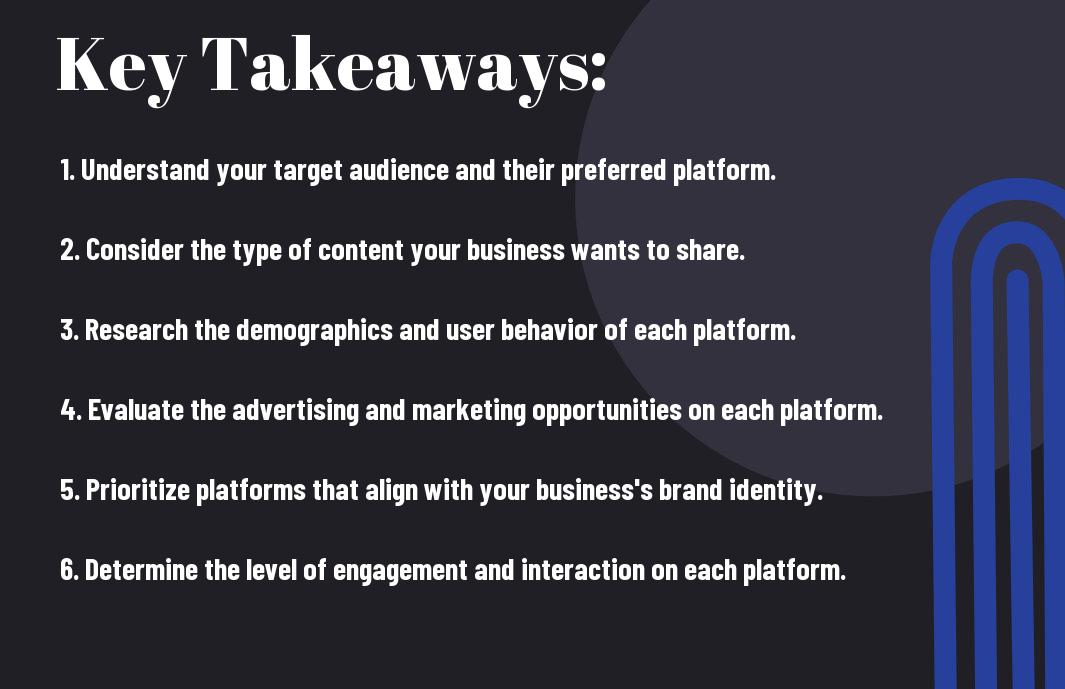Are you feeling overwhelmed by the countless social media platforms available for your business? With so many options to choose from, it can be challenging to determine which platforms will be the most effective for reaching your target audience. However, making the right choice is essential for maximizing your online presence and connecting with potential customers. Understanding the specific strengths and weaknesses of each platform is crucial in selecting the ideal platform for promoting your products or services. In this blog post, we will provide you with valuable tips and insights to help you make an informed decision and optimize your social media marketing strategy.
Key Takeaways:
- Understand Your Target Audience: Before choosing a social media platform, it’s essential to understand your target audience’s demographics, interests, and online behaviors.
- Align Your Business Goals: Select a platform that aligns with your business goals, whether it’s brand awareness, lead generation, or customer engagement.
- Consider Visual Content: If your business relies heavily on visual content, platforms like Instagram or Pinterest may be more suitable for showcasing your products or services.
- Be Strategic with Resources: Consider the time and resources required to effectively manage and maintain a presence on each platform. Focus on platforms that provide the best return on investment for your business.
- Keep Up with Trends: Social media platforms are constantly evolving, so it’s important to stay updated on new features and trends to make informed decisions for your business’s online presence.

Understanding Different Social Media Platforms
Obviously, as you consider which social media platform is right for your business, it’s crucial to understand the different options available to you. Each social media platform has its own unique features, user demographics, and best practices for engagement. By gaining a better understanding of these platforms, you can make an informed decision about where to allocate your resources for the best possible results.
Overview of Major Platforms
When it comes to major social media platforms, Facebook remains one of the most widely used platforms, with a diverse user base that spans all age groups. Its advertising capabilities allow for highly targeted campaigns. Instagram is popular among a younger audience and is known for its visual content, making it an ideal platform for businesses in visually-driven industries. Meanwhile, Twitter is characterized by its real-time, fast-paced nature, and is well-suited for businesses looking to engage in conversations and trending topics. Of course, LinkedIn is the leading platform for B2B networking and professional content sharing. Understanding the strengths and weaknesses of each major platform will help you make an informed decision about where to focus your efforts.
Niche Platforms and Specialized Audiences
Aside from the major platforms, there are also niche social media platforms that cater to specialized audiences. For example, TikTok is popular among younger users who are drawn to its short-form video content. Reddit is known for its unique community-based discussions and content sharing. Consider whether your target audience may be present on these niche platforms and whether your content and messaging align with the platform’s culture and expectations.
Aligning Platforms with Business Goals
To ensure that you choose the right social media platform for your business, it is crucial to align your choice with your business goals. This will ensure that you are investing your time and resources effectively. For a comprehensive guide on aligning platforms with your business goals, you can refer to 13 Top Tips For Choosing The Right Social Media Platform for Your Business on Forbes.
Brand Awareness and Community Building
When it comes to brand awareness and community building, platforms such as Facebook and Instagram can be extremely valuable. These platforms allow you to showcase your brand and engage with your audience through visually appealing content. This can help you build a loyal community around your brand and increase brand awareness. It’s important to maintain a consistent and engaging presence on these platforms to keep your audience interested and involved in your brand. Engaging with your audience on a regular basis and providing valuable content can help strengthen your brand presence and community.
Lead Generation and Sales
If your primary goal is lead generation and driving sales, platforms such as LinkedIn and Twitter can be more beneficial. These platforms allow for targeted outreach and engagement with potential leads. With their professional nature, LinkedIn can be particularly effective for B2B companies, while Twitter’s fast-paced environment can help drive quick interactions and conversions. Utilizing these platforms for direct outreach and providing compelling calls-to-action can help generate leads and drive sales for your business.
Analyzing Your Target Audience
Despite the abundance of social media platforms available, selecting the right one for your business largely depends on your target audience. You need to understand where your audience spends their time online, and what type of content they engage with the most. By knowing your audience well, you can effectively craft a social media strategy that resonates with them. For more detailed insight on choosing the right social media platforms for your brand, check out this guide on 6 Steps to Choosing the Right Social Media Platforms for Your Brand.
Demographic Considerations
When analyzing your target audience, it’s important to consider demographic factors such as age, gender, location, and income level. Understanding the demographic makeup of your audience will guide you in selecting the platforms where they are most active. For example, if your target audience is predominantly young adults, platforms like Instagram and Snapchat may be more effective in reaching them. On the other hand, if your target audience is professionals in a specific industry, LinkedIn may be the better choice for your business. Knowing the demographics of your audience will help you make informed decisions about which social media platforms to focus on.
Behavioral and Psychographic Insights
Aside from demographics, you should also consider the behavioral and psychographic characteristics of your audience. This involves understanding their online behavior, interests, values, and lifestyle choices. By gaining insights into how your audience interacts with social media, the type of content they engage with, and the causes they care about, you can tailor your social media strategy to appeal to them. For instance, if your audience is environmentally conscious, sharing content about sustainability or eco-friendly products may resonate with them. Having a deep understanding of the behavioral and psychographic aspects of your audience will enable you to create content that truly resonates with them.
Practical Considerations for Platform Selection
Keep in mind that selecting the right social media platform for your business is a crucial decision that requires careful consideration. To ensure you make the best choice, it’s important to weigh the practical considerations for platform selection. For a comprehensive guide on this topic, you can refer to How to Choose the Best Social Platforms for Your Business.
Resource Allocation and Management
When choosing a social media platform for your business, it’s essential to consider the resources required for managing and maintaining your presence on that platform. You need to consider the time, effort, and personnel needed to create and curate content, engage with your audience, and respond to any inquiries or comments. This will have an impact on your overall marketing strategy and budget. It’s crucial to ensure you have the necessary resources and bandwidth to maintain an active and engaging presence on the chosen platform. Failure to do so can result in a lackluster or inconsistent presence, which can negatively impact your brand’s image.
Measuring Success and ROI
Another critical consideration when choosing a social media platform for your business is how you will measure success and determine your return on investment (ROI). You need to establish clear objectives and key performance indicators (KPIs) for each platform in order to gauge its effectiveness. Whether it’s tracking website traffic, leads generated, or direct sales, having a solid understanding of how each platform contributes to your overall business goals is essential. Without proper measurement and analysis, you may end up investing time and resources into platforms that are not delivering the desired results.

The Importance of Choosing the Right Social Media Platform for Your Business
The right social media platform can make a huge difference in the success of your business’s online presence. By choosing the platform that aligns with your target audience, industry, and content type, you can effectively reach and engage with potential customers. It’s important to thoroughly research and understand the demographics, features, and advertising options of each platform before making a decision. Additionally, consider the time and resources you have available to effectively manage and maintain your presence on the chosen platform. By carefully considering these factors, you can make an informed decision that will ultimately benefit your business and its online marketing efforts.
FAQ: Tips for Choosing the Right Social Media Platform for Your Business
Q: What factors should I consider when choosing a social media platform for my business?
A: Consider your target audience, the type of content you want to share, and your business goals. Different platforms cater to different demographics and industries, so it’s important to choose one that aligns with your specific needs.
Q: How can I determine which social media platform my target audience is most active on?
A: Conduct market research and analyze demographic data to understand where your target audience spends their time online. You can also utilize analytics tools provided by social media platforms to gain insights into user demographics and behavior.
Q: Should I choose a platform based on its user numbers or engagement rates?
A: Both user numbers and engagement rates are important considerations. While a platform may have a large user base, if your target audience isn’t actively engaging with content, it may not be the best fit for your business. Look for a balance between a sizable audience and high engagement rates.
Q: What role do the features and capabilities of a social media platform play in the decision-making process?
A: The features and capabilities of a platform should align with your content strategy and business objectives. For example, if visual content is key to your marketing efforts, a platform with strong visual capabilities such as Instagram or Pinterest may be a good fit.
Q: How can I effectively manage multiple social media platforms for my business?
A: Utilize social media management tools to streamline content scheduling, monitoring, and analytics across multiple platforms. Additionally, consider focusing on a few key platforms that align with your business goals rather than spreading yourself too thin across numerous platforms.
